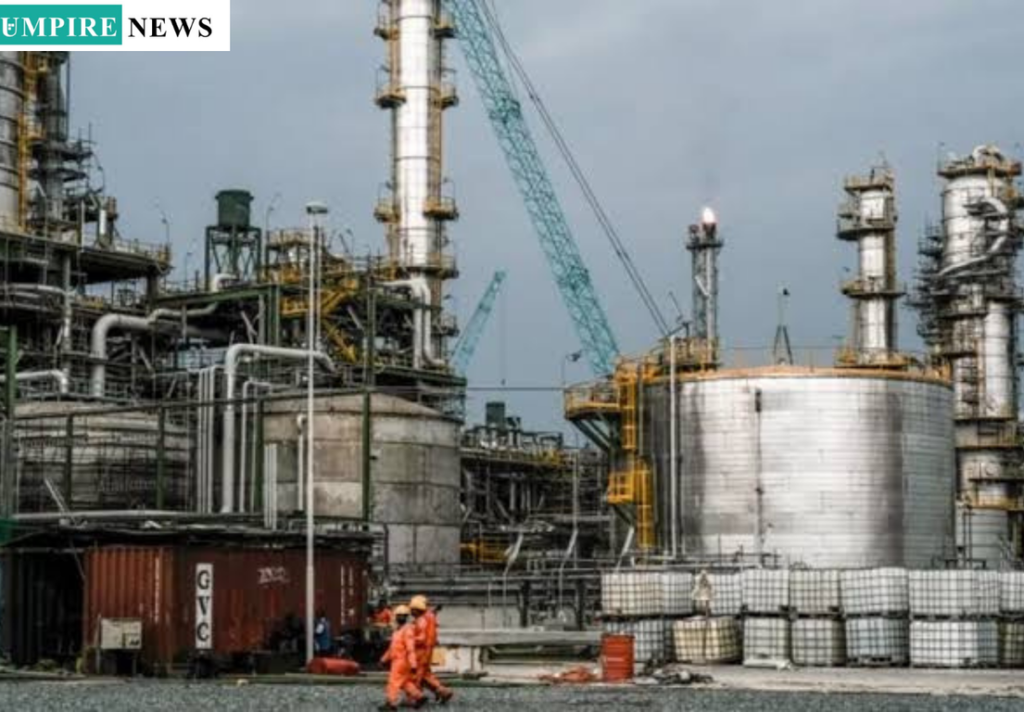The Dangote Oil Refinery is set to significantly increase its crude processing capacity, with expectations of handling up to 400,000 barrels of crude oil per day (bpd) over the next two months.
The refinery, which boasts a massive capacity of 650,000 metric tons, is located near Lagos and is gradually moving towards full-scale operations.
According to a cargo allocation list obtained by Bloomberg, the refinery is slated to receive approximately 24 million barrels of crude oil in October and November, marking a major shift toward the use of more domestic crude supplies.
This increased intake represents a significant jump from the refinery’s average processing rate of 255,000 barrels per day in the first half of the year.
The refinery’s gradual ramp-up in operations indicates a substantial scaling of activities, with the aim of reaching full capacity in the coming months.

Vartika Shukla, chairman of Engineers India Limited, the firm overseeing the project, confirmed that the refinery is currently operating at 60 to 70 percent capacity.
The continued increase in crude intake is expected to push the refinery to full capacity in the near future.
Ronan Hodgson, an analyst based in London with FGE, noted that this increased demand for crude by the Dangote refinery could have a significant impact on the West African crude oil market in the fourth quarter of the year.
According to Hodgson, the refinery’s substantial crude intake could potentially tighten the regional market, reducing Nigeria’s crude oil exports to below one million barrels per day as more oil is diverted for domestic refining.
This shift is likely to change the dynamics of Nigeria’s oil industry, particularly as the country seeks to reduce its reliance on foreign imports of refined petroleum products.
Journalists also reported that while the refinery is set to receive significant volumes of crude in the coming months, some shipments scheduled for October may face delays.
Two cargoes initially planned for September have been rescheduled for October. Despite these potential delays, the overall volume of crude oil slated for processing by the Dangote refinery in the coming months is considerably higher than its intake in the earlier part of the year, signaling a major ramp-up in refining activities.
In line with its focus on increasing domestic crude processing, Dangote has reduced its purchases of U.S. crude oil.
Earlier in 2024, the refinery imported millions of barrels of West Texas Intermediate (WTI) Midland crude but later decided to resell some of it and suspend further purchases.
Traders have noted that Dangote’s current focus on domestic crude supply is part of a broader strategy to reduce dependency on foreign imports and bolster the domestic oil sector.

A major development in the operations of the Dangote refinery is the recent agreement between Nigerian National Petroleum Corporation (NNPC) Limited and Dangote.
Under the terms of this deal, NNPC will supply crude oil to the refinery in exchange for exclusive rights to distribute the gasoline produced by the facility.
This deal is expected to provide NNPC with a steady supply of refined petroleum products for distribution in the Nigerian market.
Experts believe that Dangote’s increasing processing rates will have a positive impact on Nigeria’s long-standing goal of reducing its reliance on expensive imports of refined oil products.
For years, Nigeria has struggled with the high costs associated with importing refined gasoline and diesel, despite being one of the world’s largest oil producers.
By boosting its refinery capacity, Dangote could help the country reduce its import dependence and save millions in foreign exchange.
“As the refinery boosts production, the need for gasoline and diesel imports in West Africa will diminish rapidly,” said Ronan Hodgson, reinforcing the belief that Dangote’s increased refining capacity will play a crucial role in addressing Nigeria’s import challenges.
The refinery’s production capabilities could also positively affect the entire West African region, making the availability of refined products more stable and affordable.
In a related development, the NNPC is ending its exclusive purchasing arrangement with Dangote Refinery, signaling a major shift in how refined petroleum products will be sourced in Nigeria.
Previously, NNPC had an exclusive purchasing deal with Dangote, meaning it was the sole entity allowed to buy gasoline from the refinery and resell it to marketers for distribution.
However, this arrangement has now been dismantled to promote competition in the fuel market.
According to sources close to the matter, the NNPC will no longer act as the sole off-taker of refined products from the Dangote refinery.
This change is intended to allow other fuel marketers to purchase gasoline directly from the refinery, fostering a more competitive market environment.
Market participants will now be able to negotiate prices directly with Dangote Refinery based on prevailing market conditions, without NNPC acting as an intermediary.
An NNPC official confirmed the new development, saying, “Yes, it is true. We can no longer continue to bear that burden.”
This marks a significant shift in the Nigerian oil market, as NNPC’s role as the exclusive buyer of refined products from Dangote had placed a considerable financial burden on the organization.
When Dangote’s refinery began processing gasoline in September, the NNPC was the only authorized buyer, purchasing petrol at N898.78 per litre and reselling it to marketers at N765.99 per litre.
This arrangement meant that NNPC was effectively shouldering a subsidy of nearly N133 per litre.
By allowing other marketers to buy directly from the refinery, the government aims to reduce the financial pressure on NNPC and improve the efficiency of the fuel supply chain.
With these developments, the Dangote Oil Refinery is poised to play a central role in Nigeria’s efforts to transform its oil and gas sector, reduce import dependency, and enhance the availability of locally refined petroleum products.
As the refinery scales up operations, its impact on both the domestic and regional oil markets is expected to be profound, setting Nigeria on a path toward greater energy self-sufficiency and economic stability.































